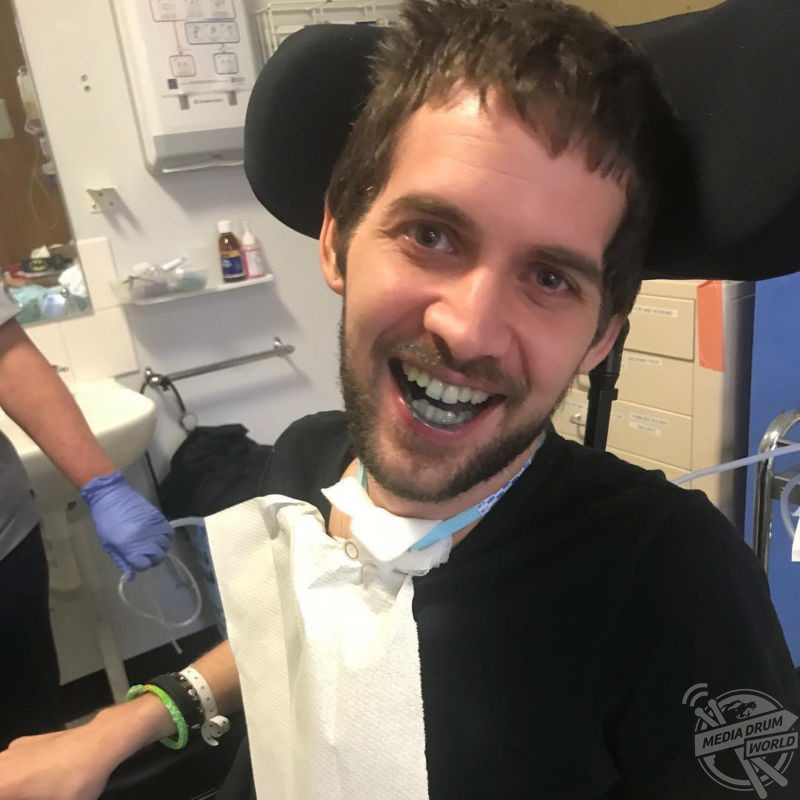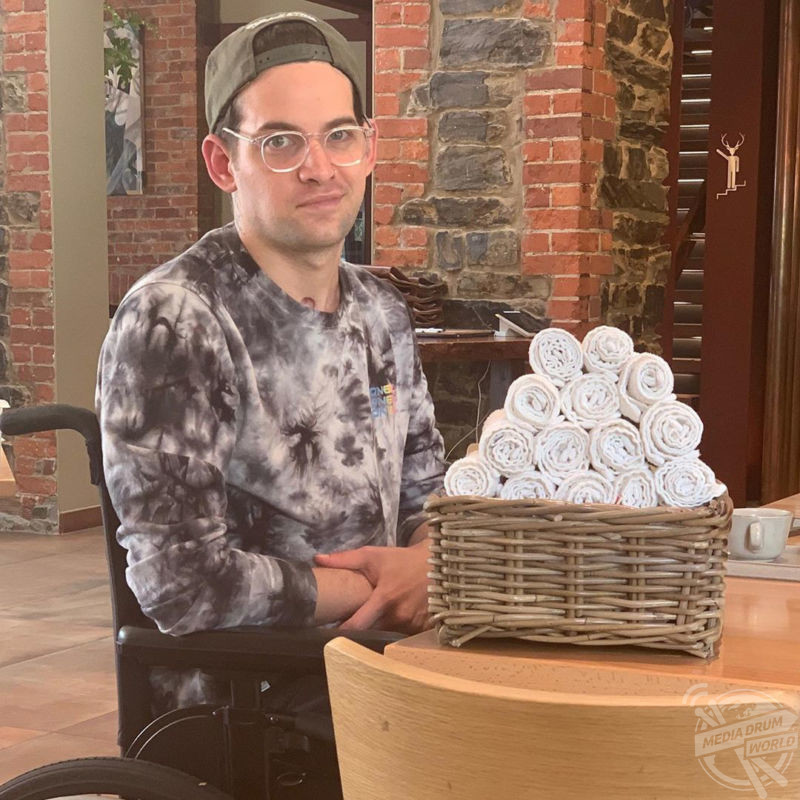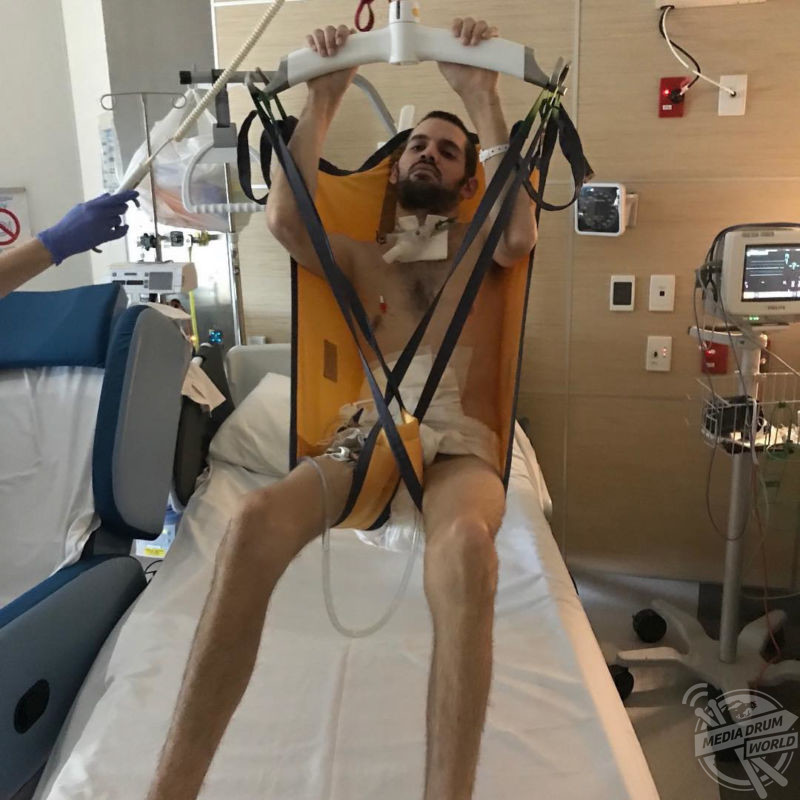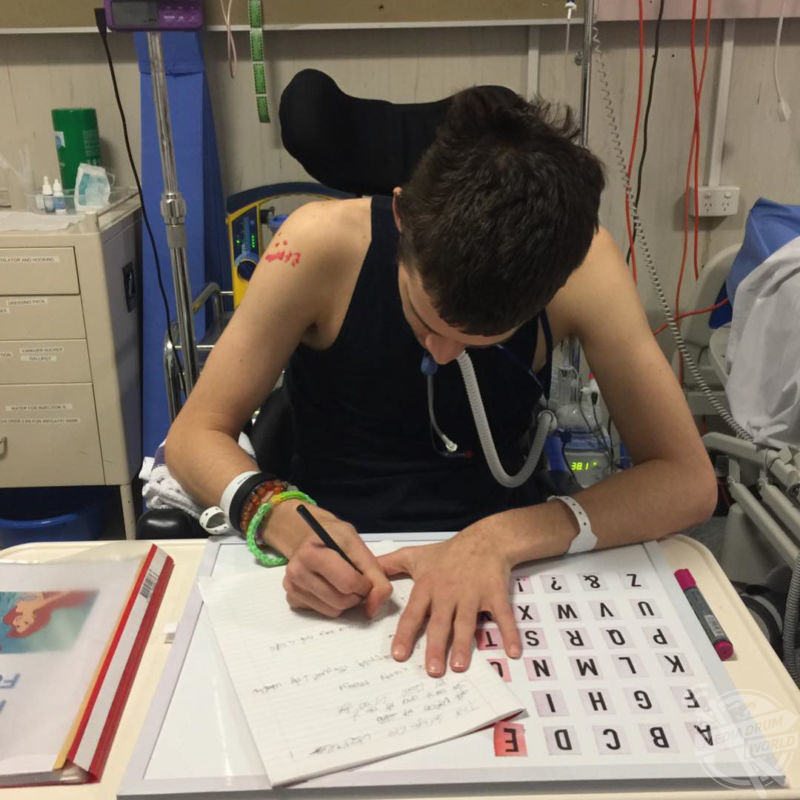By Alyce Collins
THIS BRAVE twenty-six-year-old man suffered a STROKE whilst getting out of the shower and was told he would be DEAD WITHIN THE HOUR without emergency surgery – after which he was left on life support with medics fearing he had LOCKED IN SYNDROME until he began BLINKING eleven days later.
Former waiter, Jesse Johnson (26) from Adelaide, Australia, had just come out of the shower on March 6, 2018 when he collapsed in his bedroom. He immediately called out to his sister, Tiahana (20), asking her to call an ambulance as he believed he was having a stroke.
Paramedics scored Jesse a 10 out of a possible 15 on the Glasgow Coma Scale (GCS), a neurological tool to measure ability, meaning he showed signs of intelligible response. Unfortunately, by the time he arrived at hospital, Jesse’s GCS score was revised to three, the lowest possible score which could lead to death.

Jesse was prepped for surgery although it wasn’t certain whether he would survive, but without it he wouldn’t survive the hour. Jesse was discovered to have had a stroke caused by an arteriovenous malformation (AVM). A decompression surgery was performed to stop Jesse’s brain from bleeding and swelling, but they were unable to remove the AVM due to the excess of blood.
Jesse was placed on life support and doctors warned Jesse’s partner, David (24) and Tiahana that they thought he might have locked in syndrome, meaning he was conscious and aware, but his motor function was badly damaged and he had no way of communicating. Fortunately, after 11 days, Jesse showed signs of response through hand squeezing and blinking. Jesse spent 21 days in ICU before being moved to another ward where he stayed for two months.
The stroke caused Jesse to develop cerebellar ataxia, affecting his balance, coordination, swallowing and eye movement but he continued to make slow progress. Due to having a tracheotomy tube, he was forced to communicate via a board, and one day he wrote down that he was stuck in a bad dream and couldn’t wake up from it.
Following two months on the recovery ward, Jesse was transferred to a rehabilitation centre and was able to walk using a frame by late May, transferring from his bed to a wheelchair without a sling assist and learning to talk and eat again.

“In March 2018, I collapsed in my bedroom after having a shower, I called my sister and told her I thought I was having a stroke,” said Jesse.
“She called an ambulance and provided emergency CPR until the ambulance arrived. When the ambulance arrived, I was at GCS 10, which is a neurological scale used to assess someone after head trauma. Upon arrival at the hospital, I had deteriorated to a three on the GCS.
“A GCS score of three means there’s no cognitive response, such as deep coma or brain death. The scale works on three different ratings: eye opening response, verbal response, and motor response. A low score for each category basically means there’s no response.
“When I got to the hospital, they immediately prepared me for surgery and told my partner and sister that I didn’t have a very good chance of making it through the surgery, but without surgery I would be dead within the hour.
“They discovered that I had a stroke caused by an AVM, which is a tangled mess of veins. Because of how much bleeding there was, my brain was swelling a lot. So, in the initial surgery, they removed part of my skull to relieve the intercranial pressure. They intended to remove the AVM, but because of how much blood there was, they couldn’t find it. The surgery would have been 14 hours long if they tried removing the AVM, which was too risky given the medical state I was in.

“Fortunately, I made it through surgery and was placed in ICU on life support. Six days after my surgery, my condition hadn’t changed and the doctors called my family in as they believed I had locked in syndrome where the motor function part of the brain is so badly damaged that a person can’t move any part of their body, but they’re fully conscious.
“I’m extremely grateful that didn’t happen, because if I had locked in syndrome, I would have rather died.
“After 11 days, I started responding to doctors by blinking, hand squeezing and sometimes wiggling my toes. I made very slow progress, but after 21 days in ICU I was transferred to a ward where I continued to make slow progress.
“I lost all coordination in my body, meaning I couldn’t write, stand or walk. This is a condition known as cerebellar ataxia which affects swallowing, coordination, walking, balancing and even eye movement.
“In the first couple of weeks I regained movement in my body and communicated by writing on a board. David told me that I asked him to help me via the board and I wrote ‘I’m stuck in a dream and I can’t wake up, can you help me wake up?’”

In December 2018, Jesse underwent an elective surgery to have the AVM removed because if it wasn’t removed, he was almost certain to have another stroke before turning 50. Jesse felt extremely lucky to survive the initial stroke, so he knew his chances of surviving another were slim.
Jesse has had to become accustomed to no longer being as independent as he was, although his determination to improve has helped him to progress more than doctors thought possible.
“After hospital, I was moved to a rehabilitation centre where I was seen by speech pathologists and physiotherapists daily. After two months at rehab I had my tracheotomy tube taken out, which meant I was able to talk and start eating again,” said Jesse.
“I progressed a lot as I went from needing a sling lifter to get in and out of bed to my wheelchair to being independent with my transfers. When I arrived, I was completely nonverbal and couldn’t eat, but by the time I left I could eat a normal diet and talk again. My speech isn’t as clear, but it’s understandable.
“I am currently using a four-wheeled walker, although I struggle with turning still.
“It was a difficult decision to have elective surgery but living with the constant fear of having another stroke at any time was even scarier. If I didn’t have the AVM removed, the doctors said I’d have four per cent chance of having another stroke every year, and it was accumulative, meaning I was almost guaranteed to have another one by the time I’m 50. I was extremely lucky to survive the first time; I knew if it happened again, I wouldn’t make it.

“Thankfully the surgery went well and after spending the next month in hospital I was finally able to go home again and continue with my rehab in January.
“I’m in the early stages of recovery, but I have already exceeded the expectations of many doctors, so I’m optimistic that I still have much recovery ahead of me. I’ll always have balance and co-ordination issues, but therapists said that it will be a lifetime recovery and if I work hard, I’ll continue to improve for the rest of my life.
“The hardest aspect is not being as independent as I once was. I’ve always found it hard to ask people for help and now there are many things that I need help with, so the sudden change has been very hard to get used to. I don’t want to feel like a burden to anyone.
“I tell myself not to give into the bad thoughts. If I look at the bad things, I’ll dwell on them and that will impact my recovery, so I take the complete opposite approach. I want to get as well as possible and be able to walk again unaided, and the only way to do that is through positivity.
“I think it’s very important for people to know about brain injuries and that it doesn’t matter how healthy you are, or how old you are, your life can change in an instant, so don’t take anything for granted.”
To see more of Jesse’s recovery, visit www.instagram.com/jesses_invisible_injury






